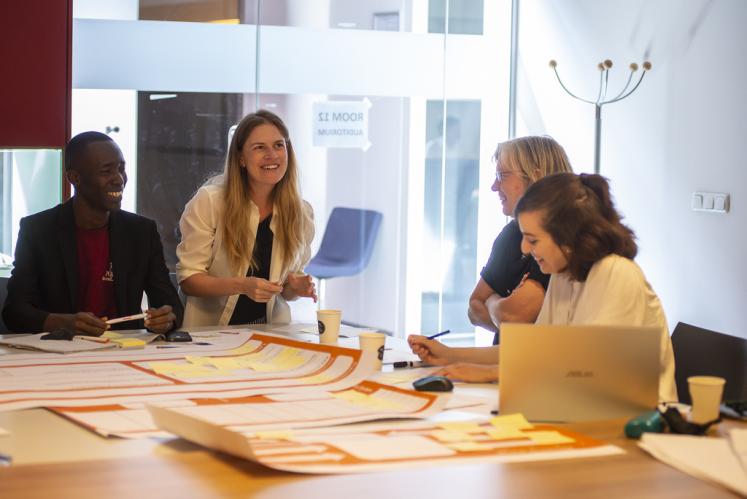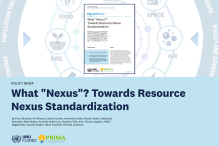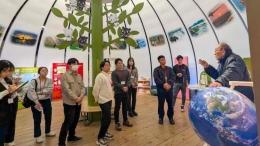UNU-MERIT’s Policy Action Lab provides a safe space for knowledge exchange between practitioners and researchers and broadens the scope of how global policy challenges and problems are framed and defined. Its core objective is: to draw on lessons learned from the experience of policy actors and other stakeholders and to translate research into practice through policy recommendations and strategies. The Policy Action Lab is part of UNU-MERIT΄s efforts to forge the path for a comprehensive and deep transformation towards a future-oriented and sustainable society.
Contemporary challenges are multifaceted and interconnected. From the ongoing war in Ukraine and the escalating refugee surge, the climate emergency and global energy crisis, to the COVID-19 pandemic and its deteriorating effects on poverty alleviation, we are confronted with highly complex realities. The ‘wickedness’ of these challenges arise from the fact that there is no simple way to resolve them and ‘fusion’ responses are required. That is, solutions that combine technological advancements, with demand-side strategies, direct support on costs alleviation for alternative pathways, as well as efficient management of environmental endowments. It becomes evident, that to map future scenarios and dismantle existing blockages we need to develop collaborative and synergetic actions.
‘’ It’s not just that the things are getting harder and more difficult despite our cleverness and our analytic power, but because of it! ‘’
Breaking the bubble of the academic world to face realities on the ground
Following these trends, research agendas and educational goals are widely oriented towards these pressing societal and policy challenges that span across institutional, physical and disciplinary boundaries. To address these challenges, we need to abandon the idea of a ‘single universe of knowledge’, usually seated within academic institutions, and embrace the notion of ‘pluriverse’, which appreciates the plurality of sources and ways of creating, sharing and using knowledge for addressing contemporary problems. Capturing a plurality and diversity of knowledge when we analyse societal challenges offers a better understanding of the issues under study, sheds light on the mental models of various decision-makers and advances the development of sustainability strategies.
The role of educational institutes is critical in guiding the process of knowledge co-production to promote sustainable transformations. This process requires the engagement of diverse stakeholders including researchers, policymakers, industrial actors, financiers, social entrepreneurs, community organisers, and citizens who bring multiple perspectives to the table. The success of such an endeavour lies in its inherent structure and the way it is organised. Universities are well-positioned to provide a safe and enabling environment, where collaborative, open, meaningful and sustained interactions can occur among these different groups of actors, capacities can be developed, and knowledge can be shared across the boundaries of single groups and stakeholder organisations.
Such a collaborative approach to knowledge generation for addressing societal problems can yield multiple benefits for the university and society overall. Through their participation, stakeholders outside academia gain access to credible and relevant knowledge around their challenge topics and broaden their perspectives on the ways they can be analysed and addressed. Students get the opportunity to engage in real-world challenges, test their skills and knowledge acquired during their studies, and draw valuable lessons for their dissertations and future career steps. Researchers can connect with relevant partners in line with their own research agenda, develop initial research insights or gain a deeper understanding of the issues at hand.
Policy Action Lab: A ‘safe harbour’ for change at UNU-MERIT
The Policy Action Lab paves the way to inclusive and sustainable societies by enabling knowledge exchange between practitioners and researchers to deliver impactful policy recommendations and strategies. In May 2022, the Policy Action Lab at UNU-MERIT hosted its first event, with the goal to realise this vision. A full day of activities was held aiming to train participants on how to design, evaluate and accelerate sustainability efforts targeted at systems in need of transformation, as well as how to communicate scientific research to policy actors and other societal partners.
A workshop was formed around four areas of focus:
- Circular Transitions – With a local orientation around the plastic and textile waste management efforts of the city of Maastricht, the first group worked on the issue of stakeholder engagement to accelerate a transition to a circular economy. The group was supported by Mrs Janne Zwart, Policy Coordinator at Maastricht Municipality.
- Water, Sanitation and Hygiene (WASH) – The second group joined forces to formulate inclusive strategies to improve sanitation, hygiene and adequate access to clean water in specific regions in Namibia, Ghana and Kenya, respectively. The group was supported by Mrs Annemarieke Mooijman, Dr. Caroline van den Berg, Dr. Mirjam van Roode, and Ms Taffy Chirunda, WASH and Environmental Innovation specialists
- Missing Complementarities in Innovation – The third group was challenged with the issue of missing complementarities in developing economies, which make innovation policy far more challenging and complex. Participants in this group explored the pathways to achieve adoption of electric vehicles in Kerala (India) by 2030, looking into environmentally sustainable, economically viable solutions, adapted to local challenges. The group was supported by Dr. Dario Diodato, Economic Analyst at the European Commission and Dr. Nanditha Mathew, researcher at UNU-MERIT.
- Dark Side of New Technologies – The fourth group tackled the challenge of the environmental burdens that arise from new technologies and the need to move towards environmentally responsible technological solutions, looking into the management of battery waste from electric vehicles. The group was supported by Dr. Lili Wang, researcher at UNU-MERIT.
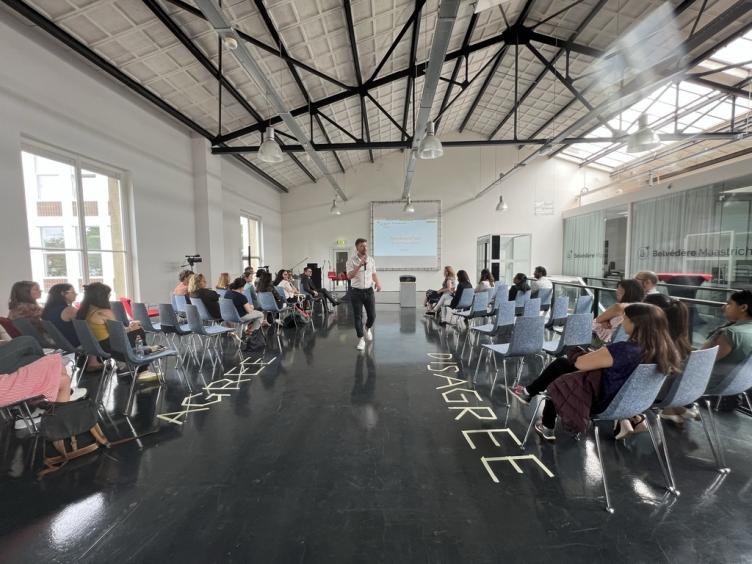
Students and researchers worked collectively with policy and other societal stakeholders to identify, adapt or design strategies for accelerating inclusive and sustainable transitions. Their work was supported by several tools designed by our ‘’transition team’’ (Thomas Baar, Serdar Türkeli, Maria Tomai) specifically for the needs of the Policy Action Lab. Students have put into practice concepts and methods from systems thinking and transition science in an inter- and transdisciplinary setting to address complex, real-world sustainability challenges. One of them was a modified version of the Transition Model Canvas, guiding the discussions through the key elements and stages characterising socio-technical systems transitions, allowing for a smooth introduction to the fundamentals of sustainability science. Other tools included a stakeholder mapping exercise and a force field analysis, which helped to identify the restraining and driving forces to change.
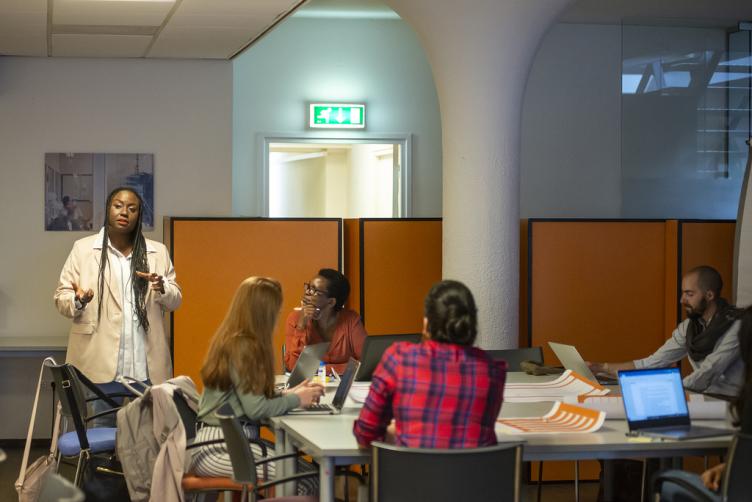
One of the highlights of the event was the panel discussion with UNU-MERIT’s Prof. Dr. René Kemp and Prof. Dr. Shyama V. Ramani, who shared their experience on the hindrances and endowments of participatory action research and triggered participants to think through the lenses of multiple-value creation to gain the support of several stakeholders’ groups. A science communication workshop organised in-between the group sessions also gave the opportunity to participants to gain insights into the skills and tricks required to translate research findings into concrete and actionable policy recommendations.
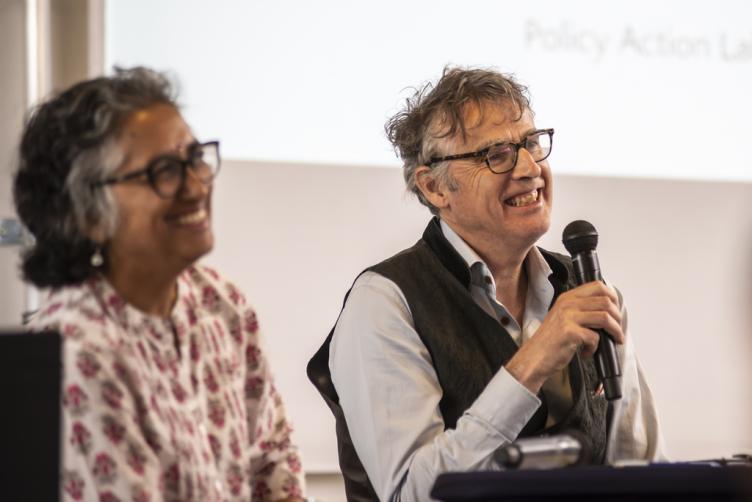
The results of the Policy Action Lab were discussed and evaluated with different policy actors during a Policy Research Panel that also took place in May, followed by an open debate on the role researchers can take in engaging with policy actors and other societal partners in informing policy. Participants also had the chance to share their feedback through an anonymous evaluation survey that was shared with them after the event. The results were very encouraging, with participants reporting the learning benefits of the Policy Action Lab and the opportunity they had to create new networks. Researchers and external stakeholders also engaged in a fruitful dialogue which led to promising avenues for new collaborations which we hope to be able to share with you shortly.

